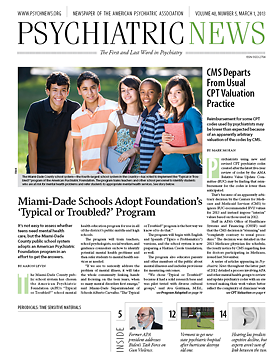The Miami-Dade County public school system has chosen the American Psychiatric Foundation (APF)’s “Typical or Troubled?” school mental health education program for use in all of the district’s public middle and high schools.
The program will train teachers, school psychologists, social workers, and guidance counselors on how to identify potential mental health problems and then refer students to mental health services as needed.
“If we are to seriously address the problem of mental illness, it will take the whole community linking hands and focusing on the teen years, when so many mental disorders first emerge,” said Miami-Dade Superintendent of Schools Alberto Carvalho. “The ‘Typical or Troubled?’ program is the best way we know of to do that.”
The program will begin with English and Spanish (“Típico o Problemático”) versions, and the school system is now preparing a Haitian Creole translation, as well.
The program also educates parents and other members of the public about mental illnesses and includes provisions for measuring outcomes.
“We chose ‘Typical or Troubled?’ because it had a solid research base and was pilot tested with diverse cultural groups,” said Ava Goldman, M.Ed., administrative director of exceptional student education and student support in the Miami-Dade system.
“We want to enlist all school personnel in becoming alert to early warning signs,” Goldman told Psychiatric News. “Often students who are withdrawn may make better connections with support staff at the school.”
The program has been used in more than 500 schools and school districts and has educated more than 40,000 teachers, coaches, administrators, and other school personnel across the country. The program trains school professionals to spot early warning signs and refer children who appear to be at risk to mental health professionals. The goal is to identify and treat mental health problems before they emerge as substance abuse, depression, or violence.
Miami-Dade will roll out the program in three phases, said Goldman. In March and April, the school district will start training personnel in 34 high schools with the greatest number of risk factors. The next phase will target middle-school counselors. Then all personnel will receive training during next fall’s professional development week at the start of the school year.
Teams of counselors are already in place in the Miami-Dade middle and high schools, with psychologists and social workers to back them up, so students can be referred for interventions within the schools or to community-based resources, Goldman said.
“The school is the perfect place to bring students, parents, teachers, and other school personnel together to ultimately connect those students who need help with support and treatment,” said Miami-Dade County Judge Steven Leifman, a member of the APF Board of Directors. “This program is a model program for every school community in our nation.” ■

